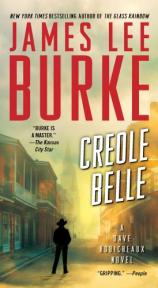Creole Belle: A Dave Robicheaux Novel
Review
Creole Belle: A Dave Robicheaux Novel
- Click here to read Roz Shea's review of the audiobook.
The good news is that CREOLE BELLE by James Lee Burke is a new Dave Robicheaux novel. The issue of whether or not there would be another after THE GLASS RAINBOW was in doubt, given its deadly and somewhat ambiguous ending, as haunting a conclusion as one is likely to have read. The great news is that CREOLE BELLE, which is by turns haunting, poetic, violent, somber and inspiring, is one of Burke's best novels to date.
"CREOLE BELLE, which is by turns haunting, poetic, violent, somber and inspiring, is one of Burke's best novels to date.... If you only read one book this year, make it CREOLE BELLE. I predict that it will stay with you until the end of your days."
One does not sustain the type of damage that Dave Robicheaux did at the conclusion of THE GLASS RAINBOW without consequence. Thus CREOLE BELLE opens with Dave recuperating at a medical facility in New Orleans, his injuries alleviated with the dangerous mercies of a morphine drip that blends distant memory and fantasy with reality. His perceptions are thus in flux when he receives a visit from a young and beautiful woman named Tee Jolie Melton, a good soul whose life is nonetheless a walking car wreck.
Dave had encountered and attempted to assist her on numerous occasions while both on and off duty as a detective with the Iberia Parish Sheriff’s Department. When she leaves him an iPod with his favorite tunes, including “Jolie Blon” and “My Creole Belle,” he believes it to be an act of kindness and nothing more. What he subsequently learns, however, is that Tee Jolie and her sister Blue had disappeared weeks before her appearance at his bedside.
After his release from the hospital, Dave begins to receive late-night calls from Tee Jolie, who alludes to being held against her will. Yet these phone calls appear to be a product of his imagination as well. His family and associates are concerned that he is experiencing fever dreams at best and the aftereffects of morphine withdrawal at worst. Dave is haunted by the presence of the woman at his bedside and her disappearance. But he encounters indifference in some quarters and hostility in others when he tries to investigate the matter, even when Blue Melton is subsequently discovered floating in a block of ice in the Gulf of Mexico and bearing on her person a cryptic message about her sister.
Dave’s investigation puts him at cross-purposes with Pierre Dupree and Alexis, his enigmatic grandfather. The Duprees are people of wealth and influence, and the tenuous trails of evidence regarding the death of Blue and the disappearance of her sister that slowly lead Dave to the family are only the beginning signs of a series of crimes that are far more sinister.
Clete Purcel, Dave’s loyal and dangerous friend, is along to help, even as he expresses concern and doubt about Dave’s sanity. But Clete has deadly concerns of his own. Some shady figures in New Orleans have obtained a marker on an old debt that he had incurred and paid decades before, and are bracing him to pay it again. A violent encounter that resolves the matter puts Clete on an intersection path with a legendary contract killer named Caruso, who is in fact Clete’s long-lost daughter, Gretchen. Gretchen slowly becomes intertwined in the quieter life of south Louisiana and attempts to extricate herself from her past. Such is not to be, however, as she finds herself drawn back in for one last assignment that has dire consequences for Dave and his family. As Dave, Clete and the Duprees are drawn together into an explosive and horrific climax, the startling and horrible truth behind the Duprees’ façade is revealed as a violent justice is administered, though not without cost.
While CREOLE BELLE is told in Dave’s familiar and poetic first person voice, it is as much Clete’s story as it is Dave’s. Clete has always been one of the more colorful and complex characters in American fiction. A dangerous and badly flawed man who is a self-destructive victim of his own excesses, Clete is also as loyal, dedicated and upright an individual as one is likely to find on either side of the divide separating fact and fiction. Such qualities are writ large here, even as evil personified is present and accounted for in as chilling a manner as one is likely to encounter.
While the ending is peaceful, it is nonetheless haunting, and may well answer a question posed by Clete at one point in the book, dealing with reality and fantasy, life and death, and where the lines for each and all of them begin and end. If you only read one book this year, make it CREOLE BELLE. I predict that it will stay with you until the end of your days.
Reviewed by Joe Hartlaub on July 20, 2012





